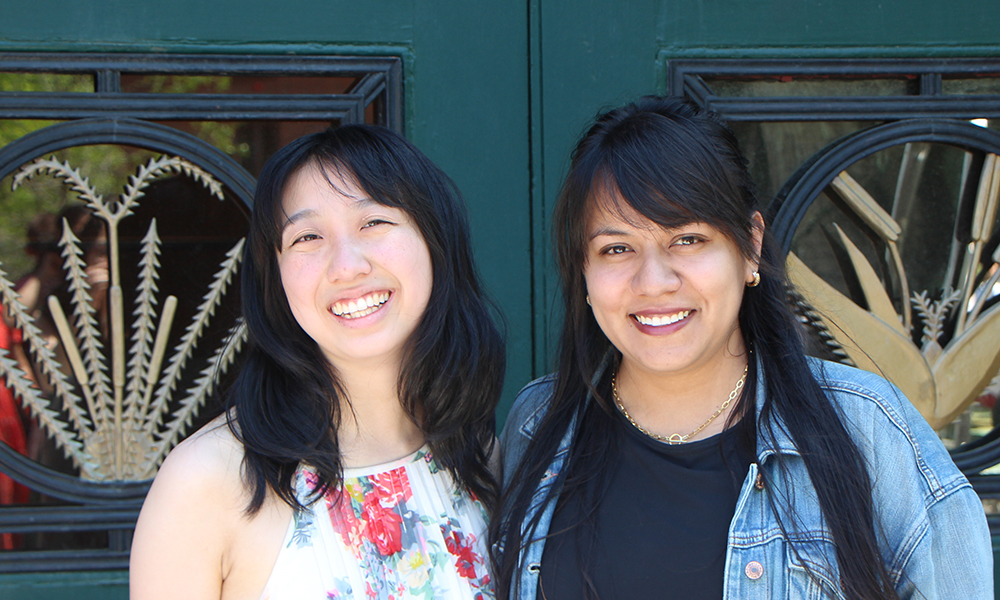Integrative Biology (IB) concentrator Julie Heng (‘24) has won a Hoopes Prize for thesis research she did in the Murray Lab. The university-wide Hoopes Prize celebrates excellence in undergraduate thesis work across all disciplines.
“It has been an extraordinary pleasure to work with Julie,” says MCB faculty Andrew Murray. “She had the courage to work on a poorly characterized genetic process, parameiosis, the persistence to complete and analyze a complicated and difficult set of experiments, and elegance and clarity to write an inspiring and beautiful thesis.”
IB concentrators typically conduct their thesis research in OEB labs, but Heng connected with Murray while she was a student in the course LS50. Once in the lab, Heng worked closely with postdoc María Angélica Bravo Núñez as her lab mentor. “One day after Zoom class, Andrew and I were talking about mating type switching and chromosomal change, and he invited me to do research in his lab over the summer,” Heng says. “Andrew talked about how the Murray Lab uses brewer’s yeast to examine all kinds of questions in experimental evolution, from the emergence of multicellularity to origins of the cell cycle. Brewer’s yeast seemed like a cool model for questions of non-Darwinian evolution and which I was thinking about. And I’ve had a blast and a half learning from everyone in the lab.”
For her thesis project, Heng looked into the fungus Candida albicans and the mechanisms that can cause it to have irregular numbers of chromosomes, or aneuploidy. Understanding how aneuploidy develops could shed light on how fungal pathogens evolve drug resistance. “In this thesis, I developed two models that examine the relationship between and consequences of non-meiotic chromosome loss and aneuploidy. The first model studies an elusive chromosome loss process in C. albicans called “parameiosis.” I showed that 1) parameiosis rapidly generates aneuploidy, which increases population-wide variation in growth, fitness, and antifungal drug tolerance and 2) most strains that lose chromosomes also become more fit and drug tolerant. The second model discovers novel chromosome loss pathways in brewer’s yeast, Saccharomyces cerevisiae. Using genetic crosses, I mapped the chromosome loss phenotype of a representative strain to a mutation (I425F) in the gene TDA9 and confirmed its role by CRISPR engineering.”
“I’m deeply grateful to Prof. Andrew Murray, who is kind and brilliant and full of aphoristic wisdom,” Heng adds. “Endless gratitude to María Angélica Bravo Núñez, HHMI postdoctoral fellow in the lab, who taught me just about everything, from how to use a pipette properly on day one. María is a role model and an inspiration, one of the hardest working and supportive people I know, and I have deeply enjoyed learning from and with her, whether seriously interrogating problems in academia or bantering about the rise of the fungi together. Thanks also to the rest of the Murray Lab, a delightful team that banters with and challenges each other: Abe Sabbarini, Alexa Pérez-Torres, Piyush Nanda, Jimena Luque, Athena Rogers, Kevin Woods, and of course Linda Kefalas.”
Heng, who earned a secondary in Philosophy alongside her IB concentration, will work on technology policy after graduation. “During college, these two interests [evolution and ethics] dovetailed, especially with the rise and dynamism of emerging technologies,” she says. “My research looks at rapid change in biological systems, but this mirrors social systems as well. So much is changing; how should we think about biotech and AI, about wellbeing and risk, about community and loneliness? Current conversations about science and technology are narrow and exclusive, but can still have outsized impact on how we all live. I’m planning to pursue emerging tech policy to help make these conversations more pluralistic and more focused on well-being.”
Heng’s colleagues and mentors praised her ingenuity. “Julie arrived at the Murray lab as an incredibly curious, smart student with minimal lab skills,” says Murray Lab postdoc María Angélica Bravo Núñez, who mentored Heng. “She is, however, incredibly dedicated and from the beginning showed that her detective skills were second to none. During her first summer in the lab, I gave a strain to Julie that had >30 mutations and she needed to find which of those mutations was causing the phenotype. By the end of the summer, not only had Julie mapped the causative allele, but she had also reconstructed it and tested it in a naïve background. That was not an easy task, yet she executed it flawlessly.”
Bravo Núñez adds, “Julie is an incredible scientist that doesn’t shy away from hard questions. For her thesis project, she ventured into understanding the mechanism and implications of an unknown cell cycle in a human fungal pathogen. For her work and dedication, the thesis reviewers granted her an ‘exceptional’ score and she was also awarded the Hoopes prize. She deserves this and so much more. And while we (The Murray Lab) are sad to see her go, we are also very excited to see how Julie will change the world next.”


